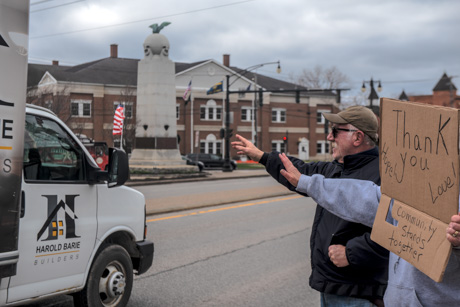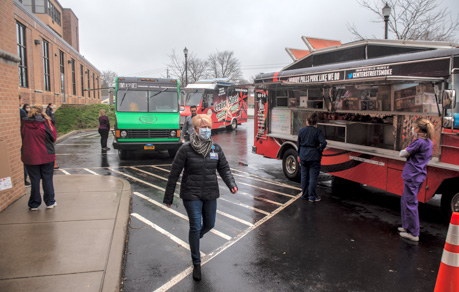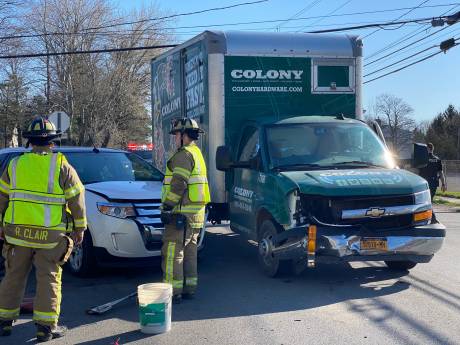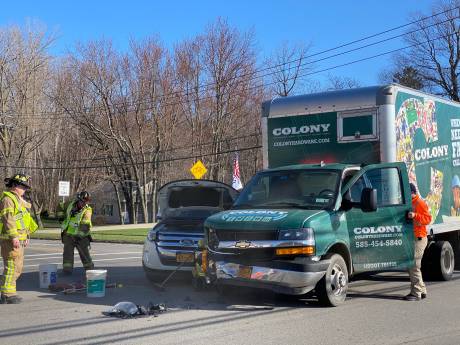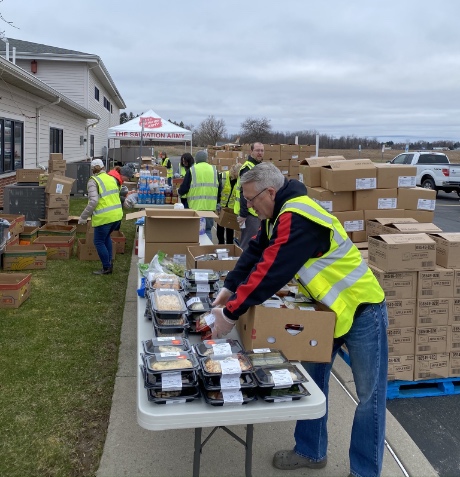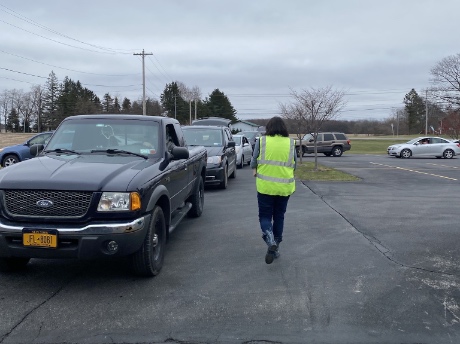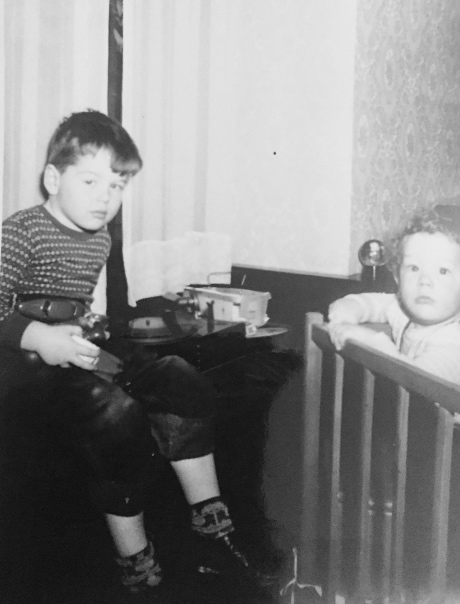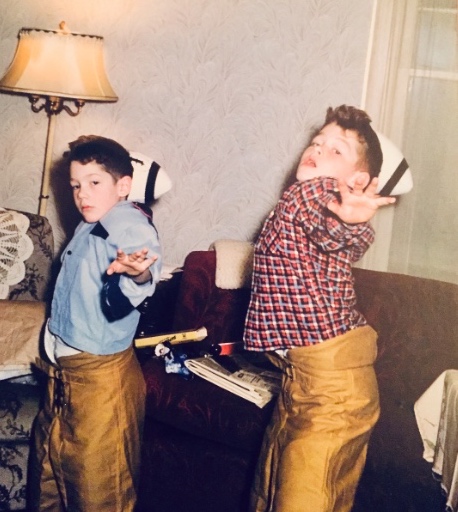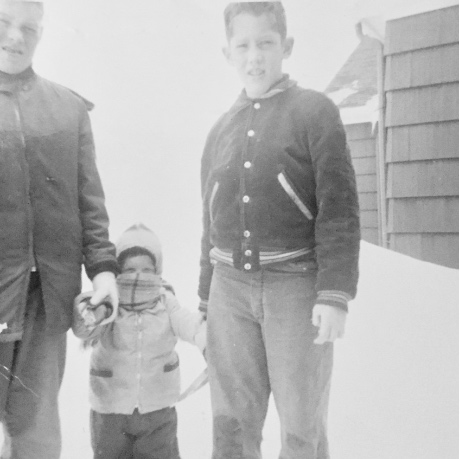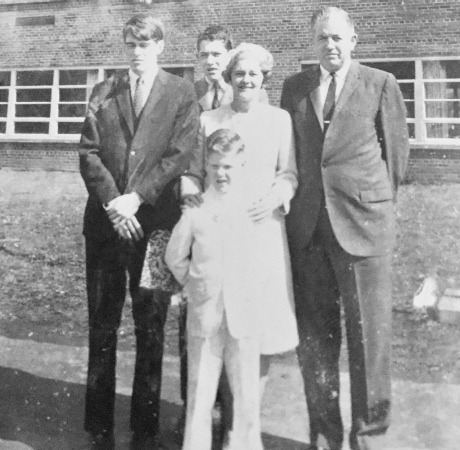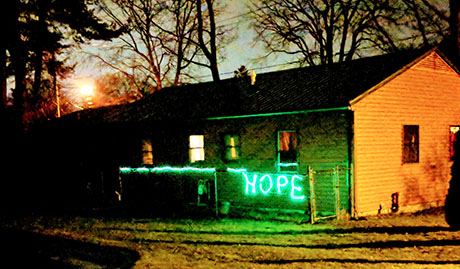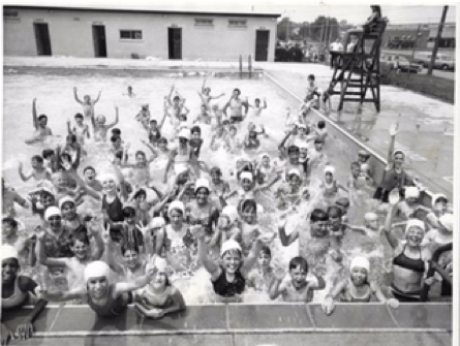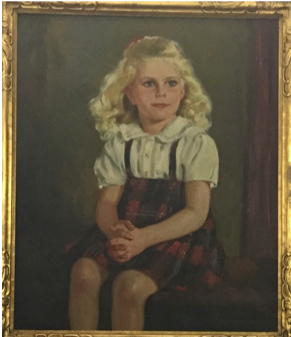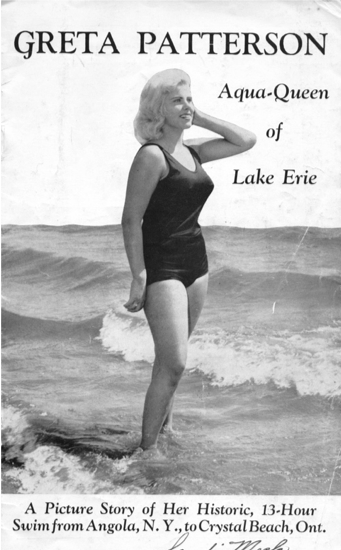(Above, 4-year-old Dave, with his first baby brother, 1-year-old Dan. No petting allowed.*)
If you come from a smaller family and have one sibling whose birthday is separated from yours by a bunch of years, you most likely remember that fateful day when your parents told you that a new brother or sister was on the way.
You were set in your routines, you got a lot of attention, you had plenty of room and all of a sudden -- a baby ? If you were a young teenager you might have had the nerve to say something like, “Mom and Dad, seriously? A baby? What were you thinking?”, accompanied by the mandatory teen eye roll.
Regardless of how you felt about this cataclysmic event and how things eventually turned out, there can be no denying that this was a major life changer in your kid existence.
I was born in January 1947. When I was 1 my parents bought a house on Thomas Avenue in Batavia, which is right across from the Holland Land Office off West Main Street. In December 1949 , 2 years and 11 months later my brother Dan came along.
Since I was not quite 3, I don't really recall having any feelings about having a little brother one way or the other. We didn't have a dog or cat, so I guess it was probably OK with me. I couldn't pet him, but other than that life went on.*
As we got a little older we shared a room even though it was a four-bedroom house. Sort of like Wally and The Beav on "Leave It To Beaver." Maybe my parents thought we'd be easier to keep track of if we were in the same space together.
One memory I have of us having the same bedroom is a night my Mom went out and Dad was left in charge. As he was putting us to bed, Dan was whining that his tummy hurt. Dad, like many fathers have been known to do, sloughed if off and said something like “Ah, you'll be fine. Just go to sleep.”
No sooner had Dad's feet begun clumping down the stairs than the prequel to "The Exorcist" began. The blankets, sheets, pillows and little brother Dan were immediately covered in projectile vomiting.
Unluckily for Mom, she arrived home soon after and got to deal with the hazmat-style cleanup. Dan was treated with Canada Dry Ginger Ale and carried off to our parents' bed for the night, and I fell asleep to the pungent aromas of Pine Sol and Lestoil while trying to stifle my gag reflex.
At some point in time asked to be separated and I was allowed to move into my own room in the rear of the house. There I could keep my ever increasing pile of “army” comics (boy do I wish I had saved those) safe and sound from the prying hands of little brother.
In 1955, my parents sold our residence. They wanted a bigger yard, but hadn't yet found one that suited them when escrow closed. So, for two years we moved one block to the west and rented the top floor of a house on Ellicott Avenue.
Since this smaller space only had two bedrooms, Dan and I were back together again. My memories of this time are fuzzy, but I do recall coming down with either chicken pox or measles (this was pre-vaccine) and I had to be quarantined in the bedroom, so Dan must have spent some time on the couch. Or more likely Dad did.
Another recollection I have from Ellicott Avenue is that Mom made friends with the lady downstairs named Midge (there's a name you rarely see anymore). I'm not sure why, but in February 1956 Dan and I were down with her watching TV for the infamous "Ed Sullivan Show" debut of Elvis “The Pelvis” Presley. Midge had a teenage daughter named Louise Ann.
I think she was pretty impressed by the performance, but apparently many were scandalized because in a later appearance Elvis's on-camera gyrations were only shown from the waist up. Good thing there was no Shakira and J-Lo back then. Dan and I being 9 and 6 were noncommittal.
In the summer of 1957 Mom and Dad finally found their big back yard at 122 N. Spruce St. across town. It was the last house on the east side of the street and there were woods behind us and to our north. There were three bedrooms so my brother and I could once again have our own space. Of course, a big play area and woods were a kid's dream.
Although Dan had to switch schools from St. Mary's to St. Joseph's, I was going to be in the sixth grade so Mom and Dad agreed to let me finish my last three years at the Catholic school on Woodrow Road. All was right with the world in our kid brains that summer.
(Above: Dan, left, and Dave with Christmas football gear, pre-baby.)
As it turned out, getting a brand-new house must have stirred something in Mom and Dad, too. One evening, they told Dan and I to come sit down in the living room. They had some exciting news to tell us.
This was not a normal situation in our family, so I'm sure Dan and I were exchanging curious glances.
"Exciting news"? Was Mom getting a job? Did Aunt Kate or Peg finally get a driver's license in their 40s? Were we driving to Buffalo? That was about as thrilling as news got for us.
I remember Mom's mouth moving (Dad had a strange grin on his face) and saying, “Well boys, sometime around spring, you guys are going to have a baby brother or sister!” I looked at Dan with my mouth hanging open. He looked like a fish looks just before you take the hook out of its mouth.
“Whaaaat?” we gasped simultaneously.
“A baby,” Mom said. “You know -- a little sister or brother for you to play with and....”
“NOOOOOO!”, we bellowed. Mom's face looked like Rocky Marciano had just rocked her with an uppercut. She certainly had not expected that kind of reaction.
She recovered nicely though and, realizing that it was too big of a shock, told us that we could talk about it more another time and we should go play. Dad still had that weird grin.
Just go play? Oh no, that wasn't going to happen. Dan and I, who hardly ever had more than a two-sentence conversation, got together to talk over this bombshell.
Once in the bedroom we had a discussion that went something like the following (keep in mind that we were 7 and 10):
"They can't bring a baby here.”
“I know. It's not fair.”
“So, what are we gonna do about it?”
“I dunno. What can we do?”
“Well, I'm not gonna put up with it.”
“Me neither."
There was probably some silence as our little kid brains mulled over our dilemma.
“OK, I got an idea,” I said.
“What?”, Dan asked?
“You know that old building at the sand wash?”
“Yeah?”
The “sand wash” off Cedar Street, now known as DeWitt Recreation Area, was a favorite forbidden play area for us. At that time is was owned by the B. R. DeWitt Company and they extracted sand from the ground, which left deep clear blue ponds of water, which is why it's a park now.
My aunts, Kate and Peg, featured in some of my earlier stories, lived together at 27 Cedar, right next to the pond area.
We were babysat by my aunts and visited them a lot and we'd sneak over there even though (or probably because) we were expressly told not to. Also, until the late '50s you had to cross the four tracks of the New York Central railroad to access the area. That made it all the more inviting.
On the sand wash property there was an old unused shed, which someone had broken the door to. We would go in there and play, and a few years later it became a good place to sneak cigarettes.
“Well, we could go stay there," I told Dan. "We could bring some clothes and when Aunt Kate and Peg are at work we could sneak in and get food. I know where they keep the key.”
“Yeah, we could do that," Dan said, "and they'd miss us and be sad they brought a baby here.”
I'm pretty sure we had no idea at that point how babies actually showed up.
So it was decided.
But of course it was getting dark out so we couldn't leave yet. So, we headed out to watch TV. On the way, we came across Mom coming to check on us.
“You guys OK?”, she asked softly.
“No, we're not OK,” I declared. “We don't want a baby. It'll cry all day and whose room will it stay in? We're gonna go live at the sand wash instead of here.
"And you can't stop us!” I added, with more bravado than I thought I had.
“Yeah,” Dan chimed in rather weakly. Hey, he was only 7.
“Oh really?" Mom replied nonplussed. “ Well, I'm sorry that you guys feel that way. We're gonna miss you.”
“Maybe I'd better go in the basement and find you a suitcase, huh?
Apparently she had recovered from the original shock at our resistance. Moms always seem to know how to deal with “running away” threats.
“Um, uh ...,” we stuttered, “maybe in awhile after our TV show.”
Well, as you can surmise, we calmed down and went to bed without a peep, albeit still sulking.
The next morning we got up and went to school and nary a word was said further about taking up residence at the sand wash.
One other incident during mom's pregnancy comes to mind and it could be filed under “Not funny/funny.”
She was what you'd call "very pregnant" when for some reason Dan and I got into a fight. I had him down in the living room and was pounding him pretty good. He was yelling bloody murder and Mom came running.
As she got to us, she slipped and fell just when Dad showed up. Fortunately for all, neither she nor the baby were hurt. That was certainly no laughing matter and Dad was infuriated, as well he should have been.
The funny part (in retrospect only) was what happened next. Dad, his face as red as the proverbial beet, came after us with a vengeance. We scrambled quickly to avoid the spanking we most certainly deserved.
For some odd reason our bathroom had a linen closet with a lock on the inside of the door and there was a large space at the bottom below the shelves. In mortal fear for our lives, we scrambled into the bathroom, slammed the door behind us, and crawled inside the closet.
We narrowly got the door locked as Dad stormed in. The "Nightmare On North Spruce Street" quickly unfolded with Dad starring as Freddy Krueger.
He pounded on the door. He shook and rattled the knob. You could picture the foam on his lips. Dan and I trembled with fear.
“You'd better come out of there!" he roared. "When I get my hands on you you'll wish I didn't! It's just getting worse for you the longer I have to wait!” And so on.
After about a minute of this, a cooler head, aka Mom, prevailed. She used an easy ploy to get dad out of there, knowing our Dad drank easily 10 cups of coffee a day for years.
“C'mon Jim,” she cajoled. “I'll get them out of there. Go have your coffee before it gets cold.”
Dad grudgingly left the scene rubbing his hands together in frustration so hard that wisps of smoke might have been visible.
Mom said, “Alright you two, come out of there.” Sheepishly we emerged from our port in a dad storm.
“You guys go to your rooms and if you know what's good for you, you won't show your faces until tomorrow morning. I'll deal with you then.”
Dad had a short fuse but, like a tornado, once the whirlwind passed things calmed down quickly. Thanks to Mom, Dan and I had escaped the wrath of Big Jim Reilly again.
Photos courtesy of Dave Reilly.
(Below, the Brothers Reilly -- Dave, Jim Jr., in arctic attire, and Dan back when you could count on serious snow.)
The rest of Mom's third and last pregnancy passed uneventfully and on April 1, 1958 (yes, April Fool's Day -- the joke truly was on Dan and I) baby brother James Reilly Jr. made his appearance (known through his infancy and to his later chagrin as "Jim Jim").
As I would suspect is the case in most families, Jim's arrival was not the big crisis we brothers had imagined. As it turned out, he was a pretty good addition to the Reillys after all.
Postscript: When I got married and had kids in the '70s and '80s, Dan and Jim got to be concert-going buddies. There is even an epic story of how they went to Long Island to see Pink Floyd in 1980 and drove back the same night narrowly making it through a whiteout near Syracuse.
Sadly, Dan died in a scuba diving accident in 1991. In recent years I have taken over his concert-buddy duties and Jim and I have enjoyed many a good show together.
The “going to live in the sand wash" tale comes up every so often to the amusement of us both.
(The Reillys circa 1964, from far left, Dave, Dan, Ann, Jim, and, in front, "Jim Jim.")


